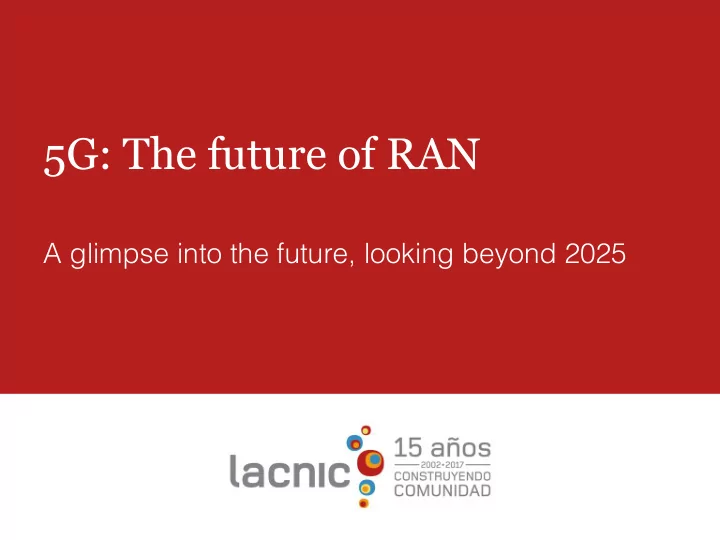

5G: The future of RAN A glimpse into the future, looking beyond 2025 �
5G: Digitalization & Automation, reaching deeper into Society The need of 5G Social & Economic Drivers and Trends Cibersecurity Universal Access to Higher security remote healthcare • 5G is meant to become Telco industry response to alerts Ageing the requirements of this socio-economic change for Government New threats Population Healthcare and security the next decade and beyond Ageing Decentralized workforce • 5G-enabled infrastructure… Generation Energy and … will not only transform individual's life (as Manufacturing Pressure on utilities costs previous generations have already done)… Increase in … but will also re-shape most industries and renewables New Devices vertical sectors, by supporting a new breed of and Services use cases Media and Automotive Strict CO2 QoS Entertainment emission goals Increasing • 5G will allow operators capture their fair share of Agriculture Climate relatively untapped markets by deploying networks Lack of farmers change that are: • Efficient : dramatically lowering cost/Gb • Targeted : flexible and suited to each use • Strong pressure to move forward with digitization case or vertical sector’s requirements and automation across very different sectors, fully (network slicing…) capturing the promised benefits (new revenue • Ubiquitous : pervasive, reliable and always- streams, higher efficiency…) on • Technology-intensive industries and verticals to lead the way, but this time changes may have deeper impact across societies
5G RAN: The next paradigm change for MNO 5G Pushing spectrum boundaries (high bands) The allocation of millimeter-wave spectrum for deployment of high capacity fixed radio links (for connecting homes/offices, or backhauling our radio base stations) could reduce civil work requirements and add flexibility Network slicing A new paradigm that enables the delivery of diverse use cases, for different verticals with different requirements, over a single network infrastructure, on the basis of NFV/SDN. Increase in performance: • High peak data rate for massive downloads on hot spot areas • Latency reduction for highly demanding scenarios • User perception of a more homogeneous coverage and enhanced reliability Cost reduction: • One Network approach, with multiple access layers fixed & wireless (licensed and unlicensed) • Enhanced efficiency (energy and spectrum resources) • Centralization and softwarization of network elements, based on over-the-shelve components
eMBB: Extending Mobile Broadband even further Expected timeline >50 Mbps 500 GB Demand // 20-50 Mbps (Throughput / DoU per month) 100 GB 10-20 Mbps 50 GB 5-10 Mbps Augmented Reality Virtual Reality 5-10 Gb Demand and Cloud Gaming Next-gen Cloud Gaming Service Evolution Video (HD) Video (4K) Cloud Workplace Vehicle Info-tainment Programmable VPNs Cell Peak Data Rate >2 Gb/s >20 Gb/s >100 Gb/s • Technical Throughput (Avg.) 5-10 Mbps 20-30 Mbps >50 Mbps • Requirements Latency <50 ms <10 ms <1 ms • LTE radio Evolution (Massive MIMO). Small • • Current LTE Networks + deployment of • Full-native 5G deployments cells (densification) LTE-A • Network Slicing Cloud RAN, SDN-NFV • Network • Extend coverage • mmWaves Initial 5G sites, co-living with 4G architecture • Architecture • Spectrum Re-farming • Small cell explosion Higher frequencies • 2017 - 20 2021 - 25 Beyond 2025
Massive IoT: From thousands to millions of connected devices Expected timeline Millions // Demand Density 100Ks (#Connected Devices / Km 2 ) devices Massive IoT Internet of All 10Ks (Tracking, agriculture, Energy, Things devices Demand and remote monitoring…) Service Evolution 1Ks devices Logistics Smart Cities Smart Home Wearables Density >10Ks Devices/Km2 >100Ks Devices/Km2 • Technical Low Energy 10 years Battery life (5mJ/byte) Improved battery life for new Verticals • Requirements Deep Coverage 164 dB, Deep basement cov. 5G will reach broader coverage in certain scenarios • (tradeoff: energy consumption) Current LTE Networks supporting: Continue of NB-IoT • • NB-IoT 5G IoT with increased capabilities for more demanding • • Network LTE-M scenarios, like advanced positioning • Architecture Access to unlicensed spectrum (SigFox, etc.) • D2D and relaying (for wearables and coverage) • 2017 - 20 2021 - 25 Beyond 2025
Questions?
Thank you!
Recommend
More recommend